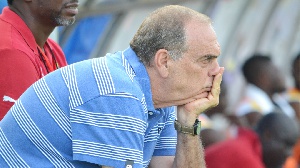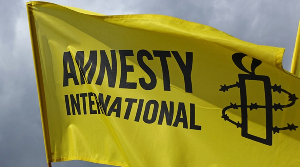Avram Grant once told Didier Drogba at Chelsea: ‘In your head there are four monkeys, and three chairs. Let’s find a fourth chair’… now he is guiding Ghana towards AFCON glory
- This year marks a decade since Avram Grant became manager of Chelsea
- Now the 61-year-old is heading for the quarter finals of the Africa Cup of Nations
- Ghana are set to face DR Congo in their bid to reach the tournament's final four
- Grant's journey has taken him from Chelsea through to a variety of different jobs
- The veteran boss once reserved some peculiar advice for Didier Drogba
- In his domestic career, Grant oversaw Champions League and FA Cup finals
This year marks a decade since Avram Grant was plucked from obscurity to become Chelsea manager, yet the Israeli barely looks any different.
Relaxing at the Ghanaian team hotel, having guided his team to the quarter-finals of the Africa Cup of Nations, Grant remains as he ever was - an odd-looking football manager, but one who is always happy to talk, crack jokes, and share his opinions.
The stories flow freely, almost without prompting - from being instructed to change out of his blue shirt when he attempted to visit Liverpool training under Bob Paisley, to helping Didier Drogba calm down with a remarkable metaphor: ‘In your head there are four monkeys, and three chairs. Let’s find a fourth chair’.
Yet for all his anecdotes, delivered in that familiar, almost cheeky, Israeli drawl, there remains, underneath it all, a fierce pride at what he has achieved. Gabon is a long way from Stamford Bridge, not only physically, but Grant remains happy to talk about his time in west London.
Having taken over from Jose Mourinho, he only lasted the rest of the season, but guided the west London club to the Champions League final, where they were a John Terry slip away from a first European title, something that Mourinho never managed in his two spells at Stamford Bridge.
‘With a lot of respect to Jose,’ Grant says, ‘I didn’t like that the media said he was the king of the world and a genius. He was not, and he’s not so useless like they are saying about him now. He’s a good coach, with problems like any other person.’
Grant, whose battles with the Ghanaian press make his relationship with English journalists look like a bit of friendly ribbing, doesn’t seem to hold a grudge that he has not been recognised for his near-misses, which also included a League Cup final defeat with Chelsea and an FA Cup final defeat when in charge of Portsmouth.
But it is also apparent that believes in what he achieved under difficult circumstances in England, particularly the attempt to move Chelsea away from Mourinho’s tactical system.
‘When I brought Henk Ten Cate to Chelsea, why did I bring him?’ he asks rhetorically. ‘He was at Barcelona and Ajax. I said, “you run the training”. The method was no more long balls to Drogba - finished, whether you want it or not. ‘I think the problem is that Chelsea don’t have an identity of how they play. Arsenal have, Pep Guardiola has, they don’t. They want to buy players and win titles but they cannot have an identity because they change coach every year or two years.
‘On the other hand they have the director of football (Michael Emenalo) doing a good job, buying good young players, so the squad is fantastic - the most balanced in England. If you see Manchester City they have very good players but the defence, with all respect, is not at the level. Liverpool are the same. I think we need to give credit to the director of football there, he’s doing a good job.
‘The one thing that is stable there is the owner (Roman Abramovich), (director) Marina (Granovskaia) and the director of football. I think it’s good for the club. If they changed Marina and Michael every year they couldn’t do well.’
Since Antonio Conte has taken over there have been signs that the rotating door at Stamford Bridge might, for now at least, stop turning.
And Grant, who keeps in touch with plenty of people at Chelsea, is not surprised that the Italian was able to turn things around so quickly.
‘It was so bad the year before – the football, the relationships. But the players are good players. Hazard didn’t forget to play at 24, none of the players did. So Conte came at the right time, the players were also ready for the change and wanted the change.
‘What I like about Conte very much, is that I think he started [out trying] to please the supporters. He played 4-4-2 and he’d never played like this in his life, I’ve followed his whole career. He played three at the back with Juventus and had very good results in Italy; he came to Chelsea and changed.
‘There are coaches who can play different systems, like Alex Ferguson. Conte, (Arsene) Wenger, their style of play will not change and it’s not good for them to change because maybe they don’t know another system.
‘I think the best thing to happen to Chelsea was that they lost 3-0 to Arsenal – then he came back his roots and they play a system that is also good for their players.
‘They are doing great and I can only respect Conte – he’s not stubborn like others and said OK, it’s not going well, let’s change it. I know the players were not happy at the beginning but this is what leadership is about – not to worry if you’re happy at the beginning. He’s doing a really good job and Chelsea are playing very well.’
Grant is still at his most engaging when discussing the intricacies of his man-management, including during his time at Chelsea.
‘Every job that I’ve had I needed to get into their head,’ he explains. ‘I said always to the players, even in England when I came, the first thing I want to do is that you understand why we do this. Why if you do this we will win games. ‘More than this, why if you are doing this you will maximize your potential. Because the players at Chelsea, if they maximize their potential, are better than the players of other teams.
‘I think Paisley changed English football,’ he says. ‘They say Shankly, I think him. ‘At the time he signed (Kenny) Dalglish when (Kevin) Keegan left and (John) Toshack finished, he changed the football. You know how the English always bring tall players: when he signed Dalglish, what was the message? “We are not playing high balls.”
‘All the players he chose in that time were to play football and the other teams didn’t know how to compete with this, even in Europe. [Liverpool] kept the rhythm of English football, that nobody could play so dynamically, and then they played on the ground, not long balls – and they won three European Cups.
‘Since I was there I followed all the games and it was amazing to see them: tap tap tap tap tap. When you say “tiki taka”, it starts with them.’
Having learned from Paisley it was no surprise that the Israeli ended up in management in England - although perhaps a shock that he started at such a big club - but now he is on a mission to bring those lessons to African football, as he looks to take Ghana to a first Cup of Nations title since 1982.
‘I came to Africa because I wanted to understand why from this talent no-one achieved as a team anything big. No African team was even one time in the semi-final of the World Cup.
‘And I found out that what I say always to football players, business people and others “nobody has enough talent to live on talent alone”. Somehow they live only by the talent.
‘In Africa, I must tell you they pick up the information very well. The players are fantastic. Coming with a positive attitude.
‘When I came to Ghana, I said in my interview, I don’t want to bring Europe here but I want to bring the good things from Europe to Africa.
‘There are a lot of good things I could take from Africa to Europe, passion and everything. But the organisation, the things around football and the preparation, I think we can help them.’















